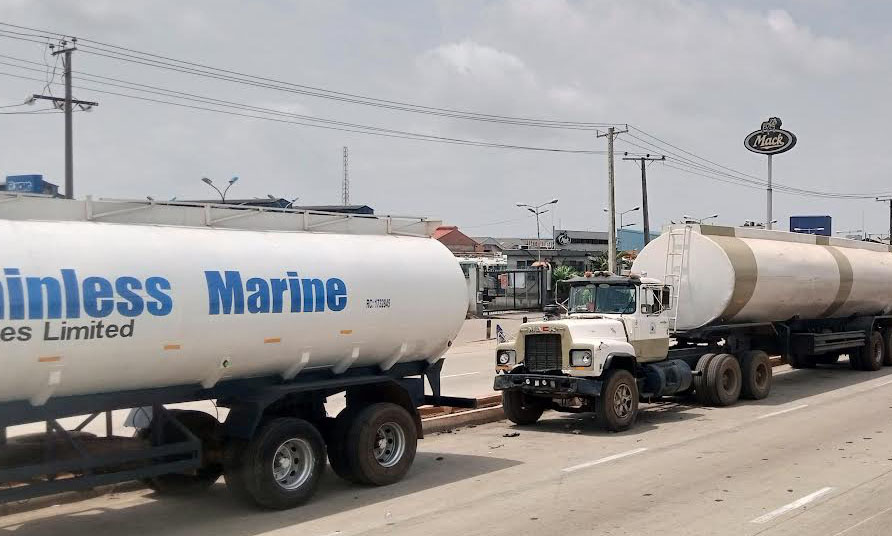
For many living and working within the Apapa corridors, connecting Apapa and its environs has become a lot easier in the past one week. This is because the indiscriminate parking of articulated vehicles on the Apapa-Oshodi Expressway which usually sometimes lead to permanent obstruction of traffic has been halted.
Before now, accessing Lagos ports; Apapa or Tincan, through Apapa-Oshodi Expressway, for instance, comes with the pain of competing with articulated vehicles heading to the port, but have turned the Mile 2 corridor from Sanya to Berger Suru Bus Stop, about eight bus stops in-between, to parking lots.
The Apapa-Oshodi Expressway inward Apapa has five columns of three on the fast lane and two on the service lane. From the tank farms around Sunrise to Fagbems Bus Stop, articulated vehicles, especially tankers are usually parked on the three columns of the fast lane and a column on the service lane of the expressway.
From Fagbems Bus Stop to Second Rainbow, two columns on the fast lane and a column on the service lane are parking lots for tankers, while from Second Rainbow to Sanya Bus Stop; tankers occupy two columns on the fast lane.
Sometimes, from Fagbems to Second Rainbow, the entire fast lane of the Apapa-Oshodi Expressway is locked down by articulated vehicles with just a column on the service lane available to other road users including articulated vehicles not heading to the ports.
That has changed. Now, rather than occupy all the columns on the fast and service lanes around Sunrise to Mile 2 bus stop and sometimes to Second Rainbow, articulated vehicles, mostly tankers now parked only on a column of the fast lane on the Apapa-Oshodi Expressway. As a result, there is smooth vehicular movement on that axis.
While a number of stakeholders commend the state government and all those who engineered the development, they feel that government needs to do more. They based their position on the fact that tankers now park to as far as Iyana-Itire from the tank farms around Coconut-Sunrise axis. This is about 18 bus stops in between.
One of the days The Guardian monitored the route and counted the number of tankers parked on the road, it was noticed that over 400 tankers were park on the Apapa-Oshodi Expressway though vehicular traffic was not obstructed as only a column of the fast lane were occupied by tankers from Mile 2 to Iyana-Itire.
Even on Friday, March 29, that was a public holiday, tankers parked on the expressway stretched to as far as Ijesha Bus Stop.
A resident of Festac Town, Titus Abiola, applauded the government for finally making the articulated vehicle drivers and the unions to be orderly in their operations.
“We must commend the government that the recalcitrant drivers and their unions were curbed and reined in on after so many years. The tanker drivers seem to be operating as if they are more powerful than government and its agencies. However, government must not stop at this. The number of tankers on the road is still too much. Throughout the week, as I was heading to work and returning home, the number of tankers lining on the road is too much.
“The government needs to take a step further to prone them to a minimum of not more than 10 tankers parking on the road at a time. If that is not done, I can bet that in days to come, we are likely to see a relapse and the tankers returning fully to the road again occupying all the lanes to blocking vehicular movement and obstruct traffic,” Abiola said.
It would be recalled that a day after Governor BabajideSanwo-Oluwas sworn-in, May 30, 2019, he promised to end the menace of articulated vehicles parking on Lagos roads, especially port access roads. He pledged this while on a field tour to Apapa and its access roads.
After touring Apapa and its access roads on that faithful day, Sanwo-Olu while speaking with journalists, said: “We have discovered that the problem of Apapa is multi-faceted; one agency cannot resolve the issue. We have met with security officers and operators on ground. We have seen that the problem is more than what one company can solve.”
He concluded by saying: “The final solution is around the corner; we are hoping in due course, we will get all these issues behind us.”
It is good that almost five years after, with several efforts to end the menace in between, Sanwo-Olu has partially fulfilled the promise.






